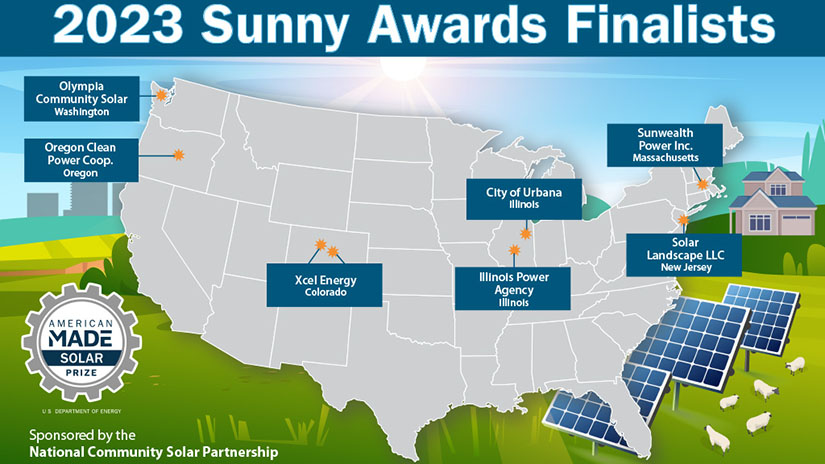American-Made 2023 Sunny Awards Finalists Announced This Week
7 Finalists Now in Consideration for Grand Prize and Meaningful Benefit Awards

On Sept. 11, the U.S. Department of Energy (DOE) Solar Energy Technologies Office (SETO) announced seven finalists for the 2023 Sunny Awards for Equitable Community Solar, with each team receiving a $2,500 cash prize. Now in its second year, this prize recognizes best practices that increase equitable access to the meaningful benefits of community solar for subscribers and their communities.
The best practices recognized by the Sunny Awards will provide a blueprint for community solar developers, state energy offices, utilities, and others to help achieve the National Community Solar Partnership (NCSP) target to power the equivalent of five million households with community solar by 2025, generating $1 billion in electricity bill savings.
Meaningful Benefits of Community Solar
As a part of the Justice40 Initiative, the White House set a goal to achieve a decarbonized electricity system by 2035 and a decarbonized energy sector by 2050. To ensure an equitable clean energy transition, the initiative directs 40% of the benefits of certain federal investments to flow to disadvantaged communities.
Community solar will play a pivotal role in achieving these goals. Community solar is defined by DOE as any solar project or purchasing program in which the benefits of a solar project flow to multiple customers, such as individuals, businesses, nonprofits, and other groups, within a certain geographic area. Community solar allows all community members to access the benefits of renewable energy, particularly those with low to moderate incomes, renters, and those for whom traditional rooftop solar is unavailable.
Through stakeholder engagement, the NCSP developed a set of five meaningful benefits that can be provided to subscribers and their communities through community solar:
- Low- to Moderate-Income Household Access
- Greater Household Savings
- Increased Resilience and Grid Benefits
- Community Ownership
- Equitable Workforce Development and Entrepreneurship.
These meaningful benefits also reflect the DOE Justice40 Priorities identified through broad stakeholder engagement, the White House Environmental Justice Advisory Council, and the DOE Office of Economic Impact and Diversity.
The 2023 Sunny Awards prize competition seeks to recognize community solar projects and programs of all business models and in any jurisdiction that are able to verify that they provide multiple meaningful benefits to subscribers and their communities.
“Providing equitable access to the benefits of community solar helps all U.S. households meaningfully participate in the clean energy transition, particularly those in underserved communities,” said Nicole Steele, SETO Workforce and Equitable Access program manager. “The projects and programs recognized as 2023 Sunny Awards finalists demonstrate best practices for delivering those meaningful benefits, and we are excited to recognize their efforts and advance them in the prize competition.”
Winning Projects and Portfolios
To receive recognition through this award, competitors were challenged to meet ambitious submission requirements that showcased the meaningful benefits delivered by their community solar projects and programs.
The following teams are recognized as finalists for the 2023 Sunny Awards:
Overcoming Solar Barriers for Multifamily Housing (Led by Olympia Community Solar, Washington): This team partnered with a low-income apartment building in 2020 to develop a solution for installing community solar on an individually metered multifamily housing project. The resulting project serves 100% low- to moderate-income households and saves residents over 30% on their household electricity bills.
Brownfield to Brightfield (Led by City of Urbana, Illinois): This team developed a community solar project on a closed, city-owned landfill that was otherwise undevelopable. These projects occupy approximately 20 acres on the capped landfill, contain nearly 14,000 solar panels, and generate a combined 5.3 MW of clean energy. Ten percent of the project capacity is subscribed by the city of Urbana and the remaining 90% provides bill savings to exclusively low- to moderate-income households in the utility territory.
Staying Sunny in Colorado (Led by Xcel Energy Colorado, Colorado): This team developed 6 MW of utility-owned community solar gardens that serve exclusively income-qualified customers. These community solar projects provide an average 30% bill savings to over 900 households and leverage the support of a statewide nonprofit to find, educate, and enroll eligible subscribers.
Illinois Solar for All (Led by Illinois Power Agency, Illinois): The Illinois Solar for All program is an income-eligible solar incentive program that delivers benefits to more than 1,100 residential households in Illinois with incomes 80% or less of area median income. The program provides bill savings equal to at least 50% of the value produced by each subscriber’s share of the project.
Co-op Solar: Owned by the People (Led by Oregon Clean Power Cooperative, Oregon): This cooperatively-owned project portfolio of two community solar projects prioritize community resilience and collective ownership at a fire station and school district buildings in the cities of Garibaldi, Nehalem, and Phoenix in Oregon. These projects include batteries that can provide emergency power for lighting and wall outlet circuits in the event of a grid outage.
Solar at CBE (Led by Sunwealth Power Inc., Massachusetts): This portfolio of three solar canopies built on a synagogue in Acton, Massachusetts, provides subscriptions and bill savings to both the synagogue’s building and low- to moderate-income households in the local community.
Prologis Community Solar Transforms Brownfield (Led by Solar Landscape LLC, New Jersey): This 2.67-MW community solar project installed on top of a warehouse in Perth Amboy, New Jersey, provides energy bill savings to over 400 nearby low- to moderate-income households and workforce development opportunities for the community.
Grand Prize and Meaningful Benefit Awards
Up to five of the finalists will be selected as Grand Prize Award winners and will receive an additional cash prize of $10,000. Finalist submissions that show strong evidence in the Meaningful Benefit or Engagement categories identified by the NCSP will also be considered for a $5,000 Meaningful Benefit or Engagement Award.
Winners will be announced in November 2023. Read more about the finalists and benefits of community solar on the official prize platform, HeroX.

